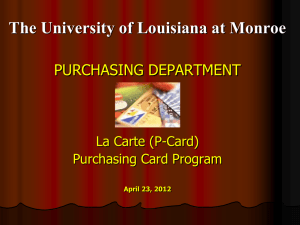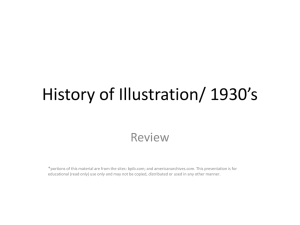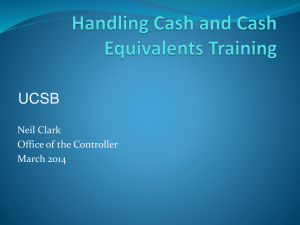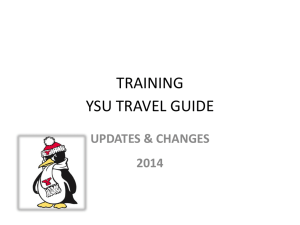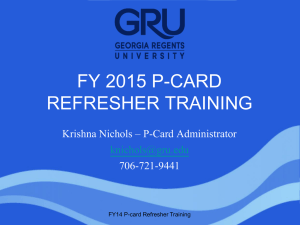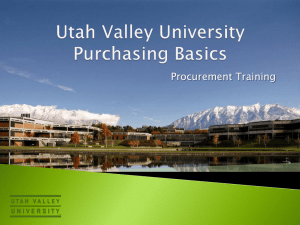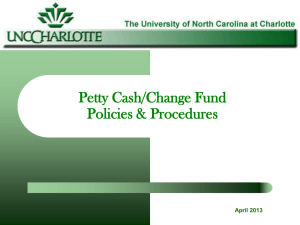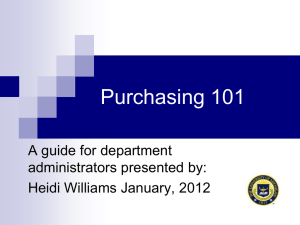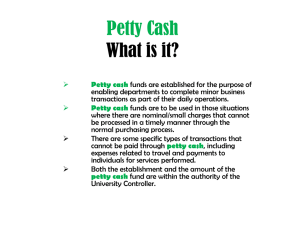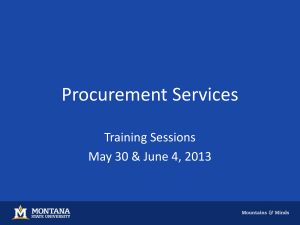Disbursement Methods
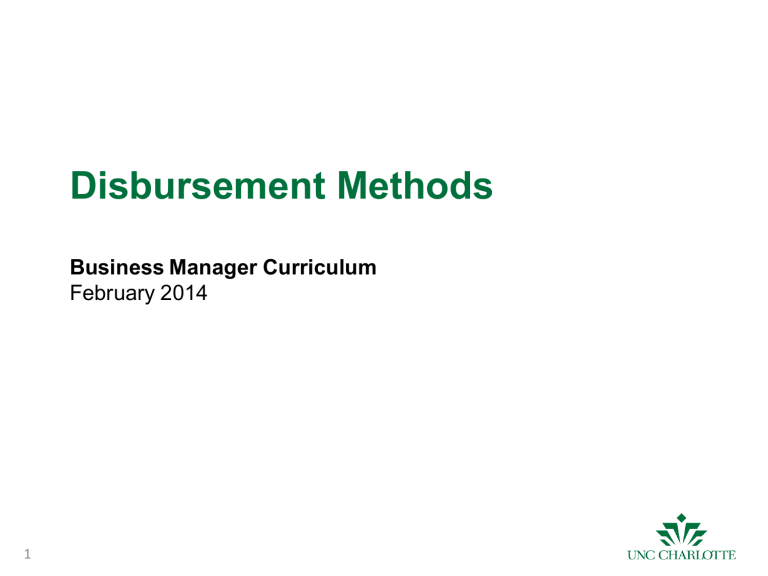
1
Disbursement Methods
Business Manager Curriculum
February 2014
2
Agenda
1. Introduction
2. High-level overview of disbursement processes
• P-Card
• e-Procurement
•
Complex Payments
• Travel
• Petty Cash
3. Discussion and wrap-up
3
Purchasing Card (P-Card)
Annette Heller
Purchasing Card Administrator
4
P-Card Program Overview
1. The purpose of the University’s P-card program is to simplify purchasing processes.
2. The program is designed to maintain accountability while reducing the cycle time and administrative burden of procurement procedures such as purchase requisitions and orders, direct pay requests, and reimbursement requests.
3. Purchase Limits:
• Single purchase limit is $2,500
•
Daily limit is $5,000
• Monthly limit is $25,000
5
P-Card Program Overview
Benefits to the Campus
•
Simplifies process for making purchases
— Examples: Conference registration fees; subscriptions to professional journals
• Reduces the need to use personal funds and submit reimbursement requests
• Reduces the need for travel advances, check prepayments, and AAA voucher codes
• Provides convenience, security, and flexibility to make small dollar purchases
• Expedites access to goods since payment is immediate
• Allows for flexibility and can be modified and customized to meet each department’s needs
6
P-Card Roles and Responsibilities
Accountholder
• Use the P-card according to internal policies and procedures
• Maintain card in secure location at all times
• Ensure spending limits and allotted budget are not exceeded
• Ensure NC sales and use tax is not charged on purchases
• Ensure a Travel Authorization (TA) is fully approved before prepaying travel expenses
• Obtain a receipt (vendor name, date of purchase, item description and total amount of purchase) for each purchase and submit to Reconciler
• Provide additional information regarding expenses to Reconciler as necessary
7
P-Card Roles and Responsibilities
Reconciler
• Receive receipts from Accountholder
• Compare receipts with transactions in Bank of America Works™
• Review and sign-off on transactions in Works:
– Provide supporting comments (e.g. description, business purpose)
– Ensure correct fund, organization and account code are used
• Reconcile discrepancies with Accountholder when necessary
• Assemble reconciliation packet (billing statement and receipts) for Approver and sign-off on reconciliation packet
8
P-Card Roles and Responsibilities
Approver
• Ensure p-card usage and activity is in compliance with internal policies and procedures
• Review reconciliation packet with transactions in Works:
– Ensure comments are documented
– Ensure correct fund, organization and account code are used
– Flag transactions as necessary
• Sign-off on transactions in Works and the reconciliation packet
• Ensure reconciliation packet is submitted to Travel & Complex Payments by the required dated
9
P-Card Roles and Responsibilities
Department Head
• Provides fiscal oversight and management of business operations within his/her department
• Selects department employees for participation in the UNC Charlotte
Purchasing Card Program based upon business need and ability to fulfill program requirements
• Monitors the use of the p-card in his/her department, taking appropriate action with departmental staff when required
• Ensures FLSA-subject staff members are performing p-card activities during regular work hours or with the advanced approval of their supervisor if overtime is required to complete task
10
P-Card Roles and Responsibilities
Purchasing Card Administrator
• Provides program management and oversight
• Develops and delivers effective training for users
• Ensures program compliance and quality assurance
11
P-Card – Levels of Review
Cardholder
Transaction
Level 1:
Reconciler
Level 2:
Approver
Level 3:
P-Card
Administrator
(transaction level)
Level 4:
P-Card
Administrator
(reconciliation packet)
12
P-Card – Discussion Questions
1. Who currently has a P-Card?
– What efficiencies/advantages has your department experienced from using the
P-Card?
– What challenges have you encountered in using the P-Card in your department?
2. If your department does not yet have a P-Card, what barriers do you see that prevent you from obtaining a card?
13
P-Card – Key Points
• Substantial efficiency benefits available to departments and the
University in using P-card
– Especially beneficial for travel-related transactions
• Defined roles and responsibilities help ensure adequate monitoring and oversight of card activity
– Cardholder, Approver, Reconciler, Administrator
• Refer to Financial Services’ resources and guidance to implement and/or expand P-card usage within your department
– Purchasing Card Manual
– P-Card Training
– “Resources” tab of Financial Services website
14
e-Procurement
Scott Brechtel
Purchasing Manager
Jerri Painter
Invoice Payment Supervisor
15 e-Procurement Overview
• UNC Charlotte’s e-Procurement program enables the University to utilize product catalogs that are custom built by each supplier and backed by a competitively bid contract.
• By using the 49er Mart platform, the purchase-to-pay business process is automated and eliminates the need for much of the paper processing that was central to the previous system.
• The State of North Carolina sets the guidelines that the University must follow.
16 e-Procurement Overview
Purchasing Office’s Role and Responsibilities
• Ensure adherence to North Carolina laws and rules governing purchases
• Extension of the State’s Purchase & Contract division with delegated purchasing authority
• Initiate term contracts to make ordering easier at the departmental level
• Review of vendor contracts
• Single point of contact with vendors
17 e-Procurement – 49er Mart
49er Mart is a web-based, e-procurement system that streamlines the requisition and purchase order process:
• One-stop shopping for catalog and non-catalog items
• Reduce time and effort in the purchasing process
• Cost savings through contract supplier aggregation
• Improved business practices via approval workflows
• Increased efficiency with the use of central invoicing and electronic receiving
• Produce, in conjunction with Banner, accurate and more timely financial information
18 e-Procurement – 49er Mart
Goods and services may be procured multiple ways using 49er Mart:
• Hosted Catalogs
• Punch-Out Catalogs
• Non-Catalog Form to order from all other vendors
• Specialized forms:
– General Services
– Change Request
– After-the-Fact
– Non-Compliant
• Multi-Invoice Service Orders
• Complete instructions available through the 49er Mart online Moodle course
19
49er Mart – Roles and Responsibilities
• Requester: A 49er Mart role which authorizes a user to shop and apply accounting codes.
– Requesters can place an order, which submits the requisition into the approval workflow, or assign the cart to another requester to enter funding information.
• Approver: A 49er Mart role which authorizes the user to approve requisition workflow steps based on accounting codes and dollar value.
– Approvers may either approve the requisition, return the requisition to the requestor with a note detailing why, reject line items on the requisition or reject the entire requisition.
– Approvers will be notified via email when a requisition has been submitted for approval. The email contains a link directly into the appropriate approval area.
20
49er Mart – Closing the Transaction
• Receiving should be completed as ordered items are actually received. Do not wait until the full order is received; enter multiple partial receipts as needed.
• When the invoice is processed against a purchase order, the Requestor will receive an email that receiving is needed.
• 49er Mart will post the receiving and return a receipt number and the PO #.
The PO# can be clicked on to review any details regarding the PO, including the updated Receipt Status.
• Payment will not be made to the vendor until receiving is completed by the department
21
49er Mart Flowchart
22 e-Procurement – Spend Analysis
• Purchasing periodically monitors departmental spend
• Compliance issues are addressed
• Opportunities for cost savings are investigated
• Contact your Purchasing Agent with questions
23
Bidding and Contract Requirements
• All procurement requests are subject to the State’s established thresholds for bidding and contract regulations (see University Policy 601.11)
– Cumulative purchases throughout the year
Under
$5,000
• Requests $5,000 and under may generally be ordered from the supplier of your choice
Between
$5,000.01 -
$25,000
• Informal bid required
Over
$25,000
• Formal bid process required
• Posted to the State’s Interactive Purchasing System website
• Anything over $500,000 exceeds the University’s delegation
• Competition waiver may be approved through use of a Sole-Source
Justification Memo (SSJ)
• Requests may NOT be split into multiple smaller requests to avoid the bidding requirements
24
Contractual Services
Purchasing Agents are the source for accurate answers on how to proceed with a contract
• Contract types available:
– State of North Carolina
– Consortiums (E&I; US Communities)
– UNCC bid/RFP contracts
• Convenience contracts for campus:
– Shredding Service; Moving Services
• Negotiation of individual departmental contracts
• Reviewing and negotiating of Terms & Conditions
• Templates available from Purchasing:
– Independent Contractor Agreement
– Personal Services Agreement
• Other useful contract forms:
– Independent Contractor Checklist
– Contract Checklist
• Many contracts available in the “Contracts” section of 49er Mart
• Consultants require special approval in addition to the contract
25 e-Procurement – Discussion Questions
1. How has the user of 49er Mart / e-Procurement improved efficiencies in your department?
2. What challenges have you encountered in using 49er Mart / e-
Procurement processes in your department?
26 e-Procurement and Purchasing – Key Points
• Be familiar with State/University procurement and bidding thresholds and requirements
• 49er Mart should be used for ordering both catalog and non-catalog items
•
Reinforce with your department that vendor invoices should be sent directly to Accounts Payable
• Refer to Financial Services’ resources and guidance to more effectively use 49er Mart in your department
– 49er Mart training course in Moodle
– “Resources” tab of Financial Services website
– Contact your Purchasing Agent
27
Complex Payments
Megan Hauser
Tax Manager
Julie Hughes
Travel & Complex Payments Supervisor
28
Complex Payments – Overview
What is a “complex payment”?
• Scholarship
• Stipend
• Honorarium
• Prizes and awards
• Payments to independent contractors
• Dual-employment payments
• Food purchases
• Personal reimbursements (non-travel)
• Any payment to an individual classified as a foreign national / non-resident alien for tax purposes
29
Complex Payments – Concepts and Tax Implications
• Worker classification:
– Should the worker be classified as an employee or independent contractor?
– Determination must take place prior to performance of any services
• NC 4% withholding:
– NC Statute requires withholding at a rate of 4% on payments of more than
$1,500 during a calendar year for certain personal services performed in NC by nonresidents and for services performed in NC by ITIN holders
• Reportable payments:
– Form 1099-MISC must be issued for each non-employee person paid at least
$600 in the calendar year for “reportable payments”
• Fringe benefits:
– A form of pay in addition to stated pay for the performance of services
– Generally taxable unless specifically excluded by IRS
30
Complex Payments – Concepts and Tax Implications
• Foreign nationals / Non-resident Aliens:
– Must withhold federal income tax from all income payments
– Withhold at 30% unless eligible for exceptions (tax treaty, IRS code)
– Must complete a Foreign National Information Form before requesting payment
• Royalties
– Payment for the use of intellectual property
– Need to determine the residency status of the payee
• Gross-up
– Increase of gross payment due to recipient to cover any taxes withheld so the individual receives the desired net amount
– Must use non-allocated funds
• Unrelated Business Income Tax (UBIT)
31
Complex Payments – DPR, 49er Mart, or Other Method?
• Complex payments may be requested through different methods, depending on the nature of the payment:
– Direct Pay Request
– 49er Mart
– HR Form (PD-7, PD-17, ePAF, CP-30)
• Certain information forms may be required to be submitted to the Tax
Office or Travel/Complex Payments office prior to requesting payment to ensure recipient is eligible for payment
– Examples: Independent Contractor checklist; Foreign National Information Form,
Vendor Information Form
• Refer to the “Independent Contractors, How to Pay” guidance contained on the Resources tab of the Financial Services website
32
Complex Payments – Roles and Responsibilities
Requestor
• Department-level
• Identify payee
• Completes payee information/eligibility forms, if required
• Completes initial request for payment
• Responsible for ensuring appropriate use of funds
Approver
• Department-level
• Reviews and approves request for payment
• Accountable for appropriate use of funds
Additional Approval
• May be required depending on nature of payment and/or funding source
• Examples: Tax Office, Grants & Contracts Admin
Payment
• Once approved, payment completed by appropriate department in
Financial Services
33
Non-Cash Transactions
• Gift cards may be used as part of a petty cash fund (e.g.– gift cards may be used to make human subject payments)
• Should be treated with same care and supervision as petty cash
• Refer to updated University Policy 101.18 on Awards/Gifts once available
(under development as of January 2014)
• Departments must maintain records documenting the use of the gift certificates and cards that include the recipients’ information and the gift certificate or card number or other similar identification number
• Departments are responsible for tracking non-cash payments to individuals within each calendar year. If the cumulative amount of non-cash transactions to an individual equals or exceeds $600 in a single calendar year, the transactions must be reported to the Tax Office.
34
Complex Payments – Discussion Questions
1. Which complex payment-related topics are you unsure of or would like to discuss more?
2. What are some of the most common types of complex payments requested by your department?
35
Travel
Julie Hughes
Travel & Complex Payments Supervisor
36
Travel – Overview
• Reimbursable travel must have official University “business purpose”:
– Attending approved job related training
– Working on behalf of or officially representing the University (including research)
– Providing a University service upon the University’s request
• Enables business expense payments without tax consequence to employees if plan is followed:
– Business purpose must be established
– Expense substantiation – receipts
– Specified period of time
37
Travel – Overview
• Travel plans should be approved in advance of the trip:
– Helps ensure that departments are aware of and have the necessary funds allocated to cover anticipated travel expenses
– Travel Authorization Form facilitates this requirement
• Timely Submission of reimbursement requests:
– Travel reimbursement requests should be submitted to the Travel Office within thirty (30) days of the return date
– Any travel reimbursement requests submitted ninety (90) days or later after the return date will be taxable to the traveler
38
Travel – Travel Manual
• University Travel Manual:
– Guidance for business officers and other faculty/staff regarding payment for travel expenses incurred for UNC Charlotte business purposes
– Developed in consideration of Internal Revenue Service (IRS), Office of State
Budget and Management (OSBM), and other applicable regulations and guidance
– Updated periodically; latest version located on Financial Services website
39
Travel – High-Level Flowchart
Travel – Roles and Responsibilities
• Travelers:
– Travelers shall be fully aware of all UNC Charlotte travel policies and procedures prior to traveling and expending funds on behalf of the University, and should conduct University business in compliance with these policies and procedures.
– Travelers conducting business on behalf of the University shall exercise good judgment and travel in a cost-efficient manner.
• Supervisors:
– Supervisors review and approve travelers’ Travel Authorization and Travel
Reimbursement Forms, along with any other travel-related forms requiring supervisor approval.
– The supervisor is responsible for ensuring that the employee’s reimbursable travel expenses are for official University business purposes, are justifiable and reasonable, and are adequately documented in accordance with guidelines in this Manual.
40
• Business Managers:
– Provide business process leadership within departments and facilitate understanding and adoption of University travel policies and practices.
41
Travel – Roles and Responsibilities
• Department Heads:
– Department Heads are responsible for ensuring that its department’s financial resources are managed in an efficient and cost-effective manner, including that travel expenses are consistent with the educational, research and professional needs of the University, as well as the mission and goals of UNC Charlotte.
• Travel & Complex Payments department (“Travel Office”) and
Purchasing Card Office:
– Units within the Controller’s Office of Financial Services that facilitate travel and business expense payments for UNC Charlotte’s travelers and employees.
• Additional Approvals:
– Depending on fund source for travel, additional approvals may be required for travel authorizations and reimbursement requests
– Example: Grants & Contracts Administration (sponsored funds)
42
Travel – P-Card Usage
• A University-issued Purchasing Card (P-Card) is the most efficient method to use when paying travel-related expenses:
– Most airlines/hotels accept P-Card
– Expedites traveler’s arrangements
– Simplifies expense reimbursement process once trip is completed
• University employees who have P-card holders within their departments may have their P-card holder pay for business travel expenses using the card once a Travel Authorization Form has been completed.
– Note that employees are not permitted to make travel-related payments on behalf of others unless payment is made on a P-card holder’s purchasing card authorized for that purpose.
• Refer to Travel Manual for allowable / non-allowable travel-related charges on a P-Card
43
Travel – Advances / Pre-Payments
• Travel Advances:
– Should only be requested when necessary
– Non-employees are not eligible to receive travel advances
– Should be reasonable and only for incidental, out of pocket expenses that cannot otherwise be prepaid
– Amount should not exceed the traveler’s estimated out of pocket expenses as indicated on Travel Authorization
– All advances must be reconciled within 30 days of return date (or no later than
June 30th of current fiscal year)
– Per OSBM Budget Manual, holders of state-issued credit cards should not be issued travel advances
• Pre-Payment Requests:
– Should only be requested for vendors that do not accept a P-Card or direct billing arrangement
– Example: Conference/registration fees when conference sponsor does not have capability to accept credit card payments, so a check must be requested
44
Travel – Discussion Questions
1. What travel-related topics are you unsure of or would like to discuss more?
2.
What is your department’s internal process for reviewing travel-related requests prior to submitting to Travel/Complex Payments?
45
Travel – Key Points
• Be familiar with University travel policies and the Travel Manual
– Serve as your department’s “champion” for understanding travel-related requirements
• Understand your department’s internal review procedures for travelrelated requests prior to submitting to Travel/Complex Payments
– Drive consistency in your department
• Refer to Financial Services’ resources and guidance related to the travel process:
– Travel Manual
– “Resources” tab of Financial Services website
46
Petty Cash
Alicia Bartosch
Reconciliation Accountant
47
Petty Cash – Purpose & Misuse
Intended for
• Purchases
• Goods & services necessary to carry out official University functions
• Low-priced items <= $100 *
• Local vendors
• Human subject payments <= $25
* Purchases may not be split into smaller increments to avoid the $100 limit. Written approval for one-time exceptions or special exceptions to exceed the $100 limit must be granted by Director of Materials Management.
Renewed annually.
Not Intended for
• Cashing checks
• Making loans or travel advances
• Reimbursements of any kind
**
• Credit card purchases
• Travel-related expenditures (mileage/fuel/parking/tips in travel status )
• Paying wages or overtime to any students or employee
** Small parking fees or tips paid while not in travel status , but as part of university business will be allowed
Petty Cash – Purpose and Misuse
Not Intended to avoid established purchasing procedures.
Should be viewed as a “last resort”
• Where purchase orders or purchasing cards (P-Card) are not accepted; and
• When processing a direct pay request (DPR) would substantially increase the cost of the transaction.
Purchases Not Allowed Through Petty Cash Established Procedures
Travel-related expenditures (meals/fuel/parking/tips in travel status ) Travel Procedure Manual
Meals or entertainment expenses for a business purpose
Commercially prepared foods*
Non-Travel Reimbursements ; Meals or Pre-paid
Dining Cards
Food Service - 709
Alcohol Alcoholic Beverages - 706
Floral tributes, small gifts and other tokens of appreciation, or prizes and awards.
Routine supplies available via purchase order or purchasing card
Gifts, Awards, & Prizes
– 101.18
(Under Development)
49er Mart ; P-Card
48
Purchases that would otherwise not be approved Appropriate Use of University Funds – 601.8
Purchasing Policy – 601.11
*Commercially prepared food purchases (i.e. pizza) not prepared by Chartwells, related to student-oriented activities, and occurring during non-business hours may be purchased from petty cash with an approved exception granted by the Director of Auxiliary Services and approved Food, Beverage, & Amenity Expense documentation.
49
Petty Cash – Roles and Responsibilities
Petty Cash Fund Officer: a staff member in the Controller’s Office with authority to approve issuance of petty cash funds and administer the funds according to University policies and procedures.
Heather Banes, General Accounting, Reese 225, ext. 75784
Petty Cash Officer Responsibilities:
• Make available and ensure compliance with current policies & procedures.
•
Notify Internal Audit of any noncompliance.
Risks Associated With Petty Cash:
•
Accessible Nature
• “After the fact” Approval
• Increased Theft, Loss, & Misappropriation of University funds
50
Petty Cash – Roles and Responsibilities
Custodian: a full-time permanent employee responsible for maintaining the security, accountability, and replenishment of a petty cash fund.
Custodian Responsibilities:
• Secure funds in a locked box, in a locked location, on campus
– Not in a bank, wallet, purse, or otherwise comingled with personal funds.
•
Limit access to only the Custodian, but inform Supervisor of location
• Complete Annual Renewal Agreement no later than May 31
•
Keep a Petty Cash Transaction Log
•
Reconcile & Replenish petty cash at least monthly, by 10 th business day
– Use Petty Cash Reimbursement Form
– Even if there have been no expenditures
– Discrepancies should be reported to Internal Audit and Petty Cash Fund Officer
– If a theft is suspected, notify Campus Police immediately. Also notify Petty Cash/Change
Fund Officer and Internal Audit.
• Allow unannounced cash counts when requested by auditors
•
Make all petty cash related documents available to auditors
51
Petty Cash – Roles and Responsibilities
Supervisor Responsibilities:
• Ensure Custodian exercises responsibilities appropriately
• Ensure Petty Cash overages/shortages are addressed and part of the employee’s performance evaluation
– Repeated overages/shortages will result in the loss of Petty Cash privileges
• Notify Petty Cash Fund Officer when Petty Cash Custodian leaves the
University
– Close out Petty Cash fund if Custodian is not available
Change of Custodian:
• Current custodian, new custodian and supervisor must sign
Change of Custodian Form and submit to Petty Cash Fund Officer
• Current custodian and new custodian must verify funds are correct
• New custodian and supervisor must submit a Petty Cash Agreement letter
• Petty Cash Fund Officer will contact new Custodian for training on policy and procedures
52
Petty Cash – Monitoring Routines
• Unannounced Audits performed by an Internal Audit representative
• Periodic reviews of fund activity performed by Petty Cash Fund Officer
– Any fund that remains inactive for six months, or is not being properly administered may be recalled
53
Petty Cash – Other Related Forms located @
General Accounting
• Petty Cash Request Form – Used to:
– Establish (Section 1)
– Increase (Section 2A)
– Decrease/Close (Section 2B)
• Deposit Form for Cash & Checks – Used to:
– Decrease/Close
•
Petty Cash Reimbursement Form
– Used to:
– Reconcile
• At any given time,
Total receipts
+ Cash on hand
+ Pending reimbursement requests
= Total authorized petty cash fund
• Over & Short Account (951720)
– Replenish
• Possible attachments:
– Original receipts ( Please Tape Down )
– Missing Receipt Affidavit (>=$25)
– Food, Beverage, & Amenity Expense Form ; Event Flyers/Agenda
– Awards and Other Gifts Log (e.g. Human Subject Payments <=$25) Under Development
– One-time exceptions from Materials Management (Special annual exceptions will be kept on file)
54
Petty Cash – Discussion Questions
1. Who currently holds petty cash funds in your department?
2. What type of purchases are made with petty cash in your department?
• How often is petty cash needed? (e.g. once a week, once a month)
3. What challenges have you encountered in using petty cash in your department?
55
Petty Cash – Key Points
• Ensure you know your “inventory” of petty cash funds within your department
•
Attempt to minimize use, where feasible
• Utilize Financial Services’ resources and guidance to help ensure compliance with University policies and procedures
56

